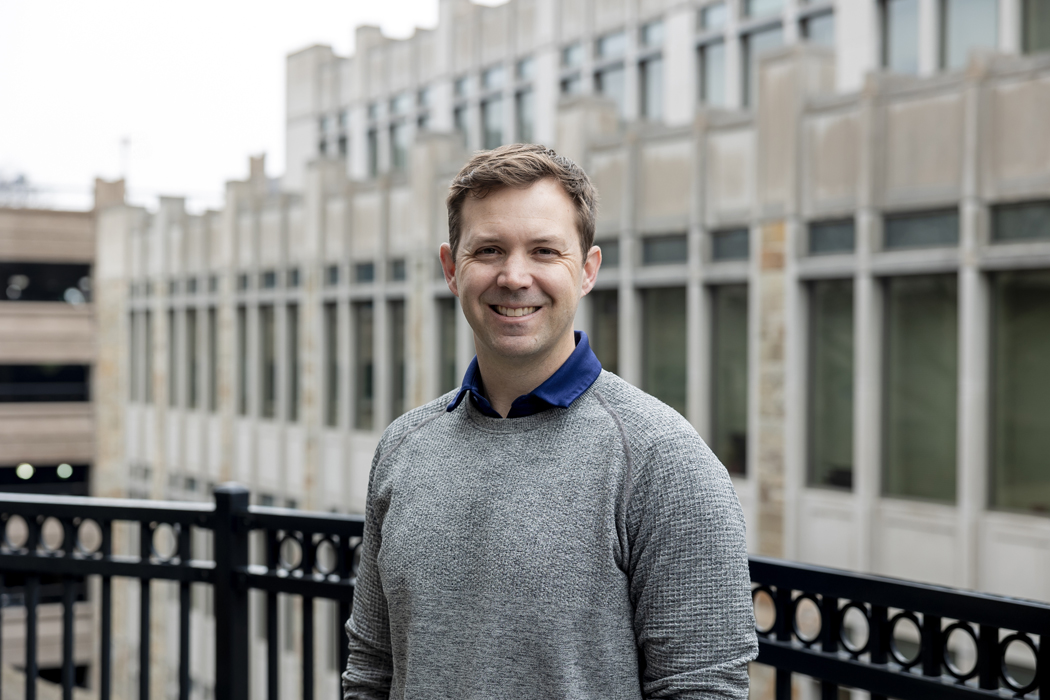
Grounded, with a different perspective
Assistant Professor of the Practice in Economics Peter Devine’s life has involved a lot of time spent in the water and in the air—and it helped put him on solid ground for a career in academia that brought him to the Boston College faculty last year.
A San Diego native with a passion for the ocean, Devine capitalized on a United States Navy ROTC scholarship to the University of Notre Dame to earn a commission as an aviator, and later flew a F/A-18 Hornet fighter aircraft while deployed overseas at Western Pacific-based Carrier Air Group FIVE.
“Growing up in Southern California and living near the beach, I had a charmed upbringing,” said Devine. “I spent my childhood in the ocean—swimming, sailing, and surfing. My friends and I quickly learned that as dilemmas or crises arose, your parents weren’t always there to save you, so you had to be responsible for yourself and the people around you.”
Devine credits the lessons of sea survival as a significant contributor to the development of his emotional maturity, and moreover, the confidence to shun panic when faced with potentially catastrophic circumstances.
“In training, your simulated helicopter—the helo-dunker—crashes into a pool, flips upside down, and you’ve got to escape,” he said. “It’s a lot, but I felt I was in my element.”
Devine’s military service provided a basis for his academic interest. In graduate studies at Duke University—where he earned a master’s degree before his Navy commission—he focused on applying geoeconomic coalitions involving flows of trade, finances, capacity, and high-innovation start-up industries to expose blind spots in defense and economic policies. He has utilized this expertise in, among other areas, analyzing the present and future economic outlook for embattled Ukraine.
“Many kids, particularly kids who grow up near air bases, want to be fighter pilots, and I did, too,” said Devine. “Although I had some last-minute doubts before committing to ROTC, my dad convinced me not to give up on a dream and at least try it for a year. That made all the difference.”
While on active duty, he served as the speechwriter for the U.S. Naval Academy’s Superintendent, taught logic, economics and econometrics, moonlighted as an economist at the World Bank, and completed a doctorate at George Washington University.

“I love being a part of BC—being a part of the community."
(Caitlin Cunningham)
After leaving the Navy, he returned to teaching at Duke, which had partnered with Ukraine’s Kyiv School of Economics. Devine lectured on econometric methods to “now-cast”—conduct short-term forecasts—regarding the Ukrainian and Russian economies during the Russian invasion to help train researchers and funnel economic information to Ukraine’s central bank.
He then undertook an international affairs fellowship at the Council on Foreign Relations. During the Biden administration, Devine served as a fellow at the National Economic Council, the principal forum used by American presidents for the consideration of domestic and international economic policy matters.
Devine chose to come to BC because he believed it was the best community for him and his wife and young son. It was a return to the ocean, albeit on the opposite coast of his childhood.
“While in the Navy, I couldn’t control where I lived,” said Devine. “Now I had a choice, and it was time to prioritize family life, and to re-engage with the holistic approach of the Catholic educational environment that had such a formative impact on me as an undergraduate.”
In February, Devine and four former Duke colleagues issued a report, “Rebuilding Ukraine,” on behalf of the Council on Foreign Relations and its Special Initiative on Securing Ukraine’s Future, and the Wachenheim Program on Peace. They contend that a successful recovery and the country’s long-term stability depend on actions that will alter the trajectory of Ukraine’s population, attract private investment to ease the burden on public finances, and provide long-term economic stability.
“Without those,” according to Devine and his co-authors, “Ukraine’s economy will stagnate and be significantly more vulnerable to Russian expansionism in the future.”
At BC, he’s taught Principles of Economics, but his passion for exposing blind spots in security and monetary policies will be on full display this fall when he’ll teach an upper-level course titled Economics and Defense, which will explore the fiscal foundation of national defense through the lens of industrial organization and technology-driven growth models.
“The current analysis of the interaction between economics and defense lacks a theoretical basis and a cause-and-effect structure, which misses or ignores the general equilibrium,” explained Devine, whose approach was influenced by his White House stint.
“I’m delighted that Peter will offer a new elective course this coming fall that builds on his expertise in national security,” said Professor Robert Murphy, chair of the Economics Department. “Our students will learn how tools of economic analysis can shed light on defense-related decisions in a rapidly evolving global landscape.”
While Devine’s thoughts may be focused on Ukraine’s economy or his upcoming class, the former aviator is happily grounded.
“I love being a part of BC—being a part of the community, seeing my students and their families at hockey games and Mass—and watching my son ride his toddler bike around campus like he owns the place. He’s fast; you need to wear shin guards.”
